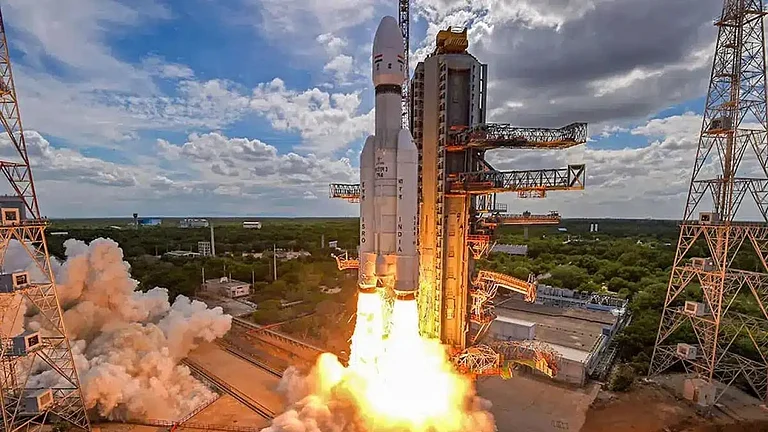“Our space sector was in shackles. We have liberated it,” Prime Minister Narendra Modi said from the ramparts of the Red Fort on Thursday. This remark, a tiny part of his 98-minute address on the 78th anniversary of Indian Independence, had the whole of India’s space-tech industry sit up and take note. A wave of hope has been flowing through the country’s space-tech ecosystem ever since the government announced a Rs 1,000-crore venture capital fund in this year’s Union Budget. The prime minister’s comment has turned that hope into optimism.
Indian space-tech has been an attractive investment destination the past few years. The sector has seen record funding of $126 million in 2023, a 7 per cent spike from $118 million in 2022 and a 235% increase from $37.6 million in 2021. But these numbers only tell a part of the story. A closer look reveals that of the $126 million gathered in funds, $120 million, 95 per cent, funds went to early-stage start-ups. A miniscule amount remains for start-ups in the late stages.
So why are India’s late-stage space-tech start-ups struggling for funds?
Help the Homegrown
One of the reasons is the lack of market access and limited government procurement, says Mahakali Srinivas Rao, chief executive of T-Hub, a company that calls itself a start-up enabler and is working with major space-tech start-ups such as Skyroot Aerospace and Dhruva Space.
Founders of space-tech start-ups say the products they are building are “highly innovative” but the government, when it needs space-tech products, mostly buys it from international legacy brands, leaving little room for homegrown start-ups.
Ronak Kumar Samantray, founder of space-tech start-up TakeMe2Space, says most space-tech start-ups building satellites have two primary customers—the government and large companies. He acknowledges that India is a very small market when it comes to earth observation products for which the primary customer is the government. Samantray, however, points out that communication could be a major use case for the industry.
He says, “India is a large consumer of communication products. Hence Airtel (oneWeb) and Reliance (SeS) entered the market. But these companies decided to buy tech from outside rather than building it in India or acquiring an emerging satellite communication company.”
Why Funding Slows
A founder of a space-tech start-up in incubation at the Indian Institute of Technology (IIT) in Kanpur says major space-tech start-ups in India can get initial funding but the funding slows down due to the lack of a market and infrastructure.
“As you grow you need to prove to the investor that your product has a market, and you need to add on to the innovation. [But] the government would choose to buy overseas, and we don’t have the infrastructure to innovate,” the founder tells Outlook Business on condition of anonymity.
According to Rao of T-Hub, “Government procurement of domestically produced space-tech solutions can provide start-ups with a reliable market enabling them to scale their innovations effectively.” “Prioritising the purchase of homegrown technology can create a sustainable market for local companies,” he says.
Need Patient Capital
Without support from government and local large industry, innovation in start-ups will be difficult to sustain. Rao says space-tech start-ups have high costs and long development cycles. They need a lot of time before they can start earning money. “This can make it hard to get funding especially from investors who have a small return cycle,” he adds. Venture capitalists usually have a five–seven-year return cycle and in space-tech that is difficult to achieve.
“There are 200 space-tech start-ups in India. But one key reason why none of them are unicorns is because these ventures typically have lengthy investment cycles. This [in turn] contributes to a cautious approach to the volume of funding. Investors are typically more hesitant to commit large sums to projects with long timelines and uncertain returns,” says Rao.
While early-stage capital is not a problem for space-tech start-ups, the need of the hour is patient capital. Scaling and commercialising Indian space-tech will depend on the government’s willingness to give these homegrown companies a chance. If the current stream of reforms work, for Indian space-tech, even the sky is no limit.
































